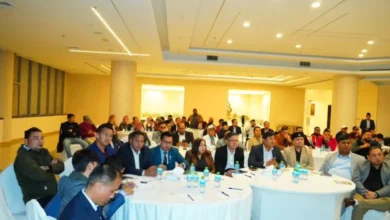New building regulations to prevent visual distortion
Al-Mutairi’s vision is to strike a balance between urban development, architectural integrity, and public service sustainability, ensuring that Kuwait’s skyline evolves with both beauty and responsibility

Eng. Mohammed Al-Mutairi, head of the Building Regulations Preparation Committee at Kuwait Municipality, unveiled a comprehensive overhaul of the country’s construction regulations aimed at preserving architectural integrity and preventing visual distortion across urban areas.
Central to these reforms is the introduction of the “Tawafuq” schedule, a pioneering framework designed to restore harmony to neglected building facades, especially in aging neighborhoods.
Despite Kuwait’s high rate of private housing development, the committee has rejected proposals to allow a fourth floor in these areas, citing strain on public services and adherence to low-density zoning under Kuwait’s Fourth Master Plan.
The regulatory updates, the result of two years of research and stakeholder consultations, build on previous laws and include changes in private, agricultural, livestock, investment, and commercial zones. Areas like Al-Wafra, Abdali, and Al-Sulaibiya have already seen approval of amendments tailored to the needs of local farmers.
Investment housing rules were also revamped to address disorder, with the introduction of new property types such as studios, incentives for including parking spaces, and revised balcony allowances.
A notable innovation is the “Compliance” schedule—a list of 21 facade standards intended to counter urban visual pollution. Property owners must now secure a Certificate of Conformity every two years, although private homes are still subject to compliance without certification.
Updates to the Free Zone redefined its purpose from industrial use to a business and service hub, introducing new floor space requirements and building ratios.
In the Abdali Economic Zone, new regulations accommodate logistics and mixed-use developments with high utilization rates. Planned amendments for agricultural zones will permit small-scale processing facilities and retail points on farms to boost food security.
The reforms also introduce stricter enforcement, including a KD 10,000 fine for defying stop-work orders during illegal construction. Al-Mutairi credited a dedicated team of municipal experts for the reforms and emphasized that the changes aim to balance development, aesthetics, and infrastructure sustainability—guiding Kuwait’s urban growth with responsibility and vision.
Ultimately, Al-Mutairi’s vision—reflected in the newly drafted and approved regulations—is to strike a balance between urban development, architectural integrity, and public service sustainability, ensuring that Kuwait’s skyline evolves with both beauty and responsibility.
Ultimately, Al-Mutairi’s vision—reflected in the newly drafted and approved regulations—is to strike a balance between urban development, architectural integrity, and public service sustainability, ensuring that Kuwait’s skyline evolves with both beauty and responsibility.












